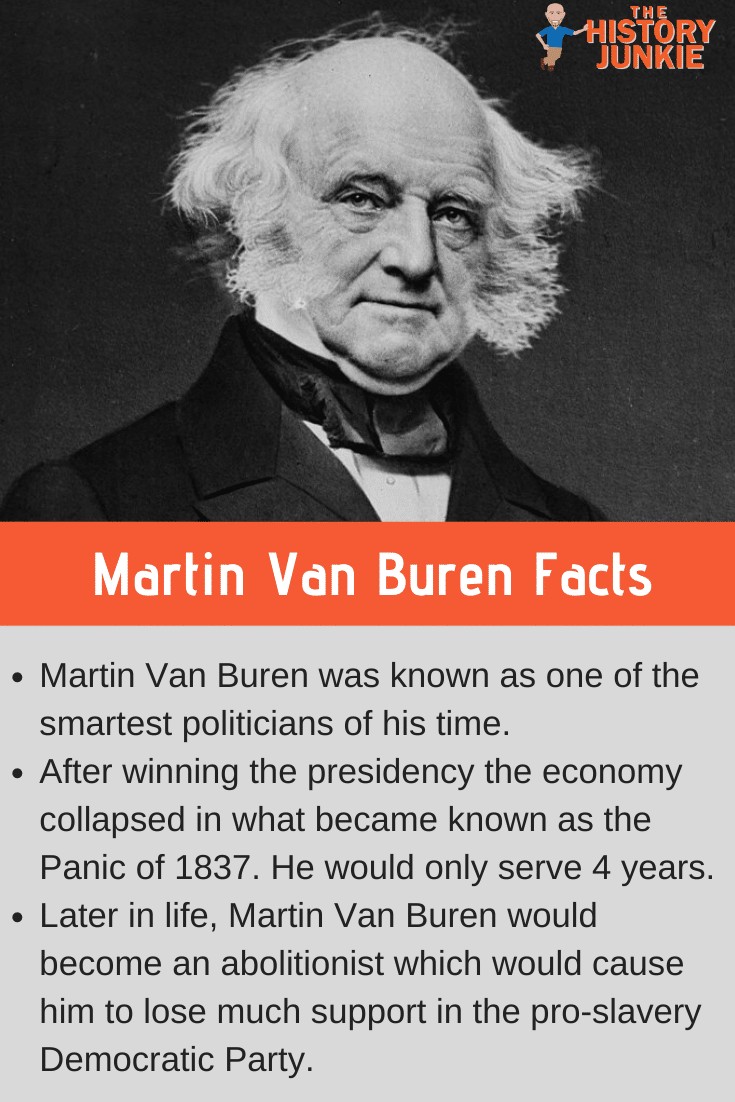President Martin Van Buren was one of the smartest politicians of his time. He was an excellent strategist and Andrew Jackson's right-hand man.

As President, he inherited a bad situation and did not do anything to make it better. He would be easily defeated by William Henry Harrison in the next election.
Martin Van Buren's Term
March 4, 1837: Martin Van Buren delivers his inaugural speech and says that he will stick to the policies of his predecessor.
May 10, 1837: The Panic of 1837 begins to take over the United States as New York does not make their Specie payment.
August 25, 1837: Secretary of State John Forsyth rejects the petition submitted by Texas for annexation.
September 4, 1837: In a special message to Congress, Van Buren criticizes the state banks and advocates for specie currency and an independent treasury system.
October 12, 1837: Congress authorizes the issue of $10 million in treasury notes as a way to ease the fiscal situation.
October 21, 1837: Van Buren receives criticism for the capture and death of Seminole chief Osceola.
November 7, 1837: Abolitionist Elijah Lovejoy is murdered by a pro-slavery mob in Illinois.
December 29, 1837: Canada begins to want independence from Britain. Under the leadership of William Lyon McKinley, the Canadians rebelled against Britain. The rebellion causes death to an American and creates much anti-British sentiment across America.
January 5, 1838: President Van Buren takes a neutral stance and does not get involved in the rebellion. This was a wise move that kept America out of another war.
January 13, 1838: Canadian rebels surrender Navy Island and then return their arms to an American militia. America began to protect its territory from being used in the conflict in order to stay neutral.
February 14, 1838: In protest of the Gag Rule, John Quincy Adams submits 350 petitions against slavery and the annexation of Texas.
May 29, 1838: Americans set fire to a Canadian ship in response to American death.
July 7, 1838: Congress recognizes all railroads in the United States as postal routes.
August 18, 1838: Van Buren commissions Charles Wilkes to lead the first national marine exploration. Wilkes explores the whaling routes of the Atlantic and Pacific Oceans.
November 21, 1838: Van Buren issues a second neutrality proclamation to avoid war with Britain and discourage American involvement in the Canadian rebellion.
November-December 1838: Americans on the Canadian border form secret societies known as Hunter's Lodge to overthrow the British government. It doesn't work, and they are arrested as soon as they cross the border.
December 1838: The Trail of Tears begins when 14,000 Cherokee are forcibly removed from Georgia. 4,000 Cherokee died, while 1,000 Cherokee escape.
January 1839: A dispute over the Maine border arises with Canadian Lumberjacks.
February 12, 1839: Canadian lumberjacks capture Maine land agent Rufus McIntire as he attempts to expel them from the Aroostook Valley. This sets off the Aroostook War. Congress authorizes Van Buren to call up 50,000 troops.
March 1839: General Winfield Scott negotiated a truce between Maine and New Brunswick, thus ending the Aroostook War.
November 13, 1839: The anti-slavery Liberty Party was founded by Gerritt Smith. The party advocates abolition but not secession.
December 4, 1839: William Henry Harrison is nominated as the Whig candidate for President despite not having any political experience. John Tyler is nominated as the Vice President.
March 23, 1840: The Baltimore Republican writes a piece that pokes fun at Harrison's frontier lifestyle. The Whigs seize the opportunity to market Harrison as a rugged frontiersman in contrast to Van Buren's polished image as a politician. It works.
March 31, 1840: Van Buren passes an executive order limiting the work of federal employees to 10 hours a day.
May 5, 1840: Van Buren is nominated by the Democratic Party for President.
July 4, 1840: Van Buren signs the Independent Treasury Act that sets up federal depositories independent of state banks.
December 2, 1840: William Henry Harrison is elected as President.
December 13, 1840: Alexander McLeod is arrested for the murder of an American seaman during the Caroline incident. Britain demands his immediate release.
December 26, 1840: Secretary of State John Forsyth declares that New York has the jurisdiction and not the Federal government. Mcleod stood trial and was acquitted.
